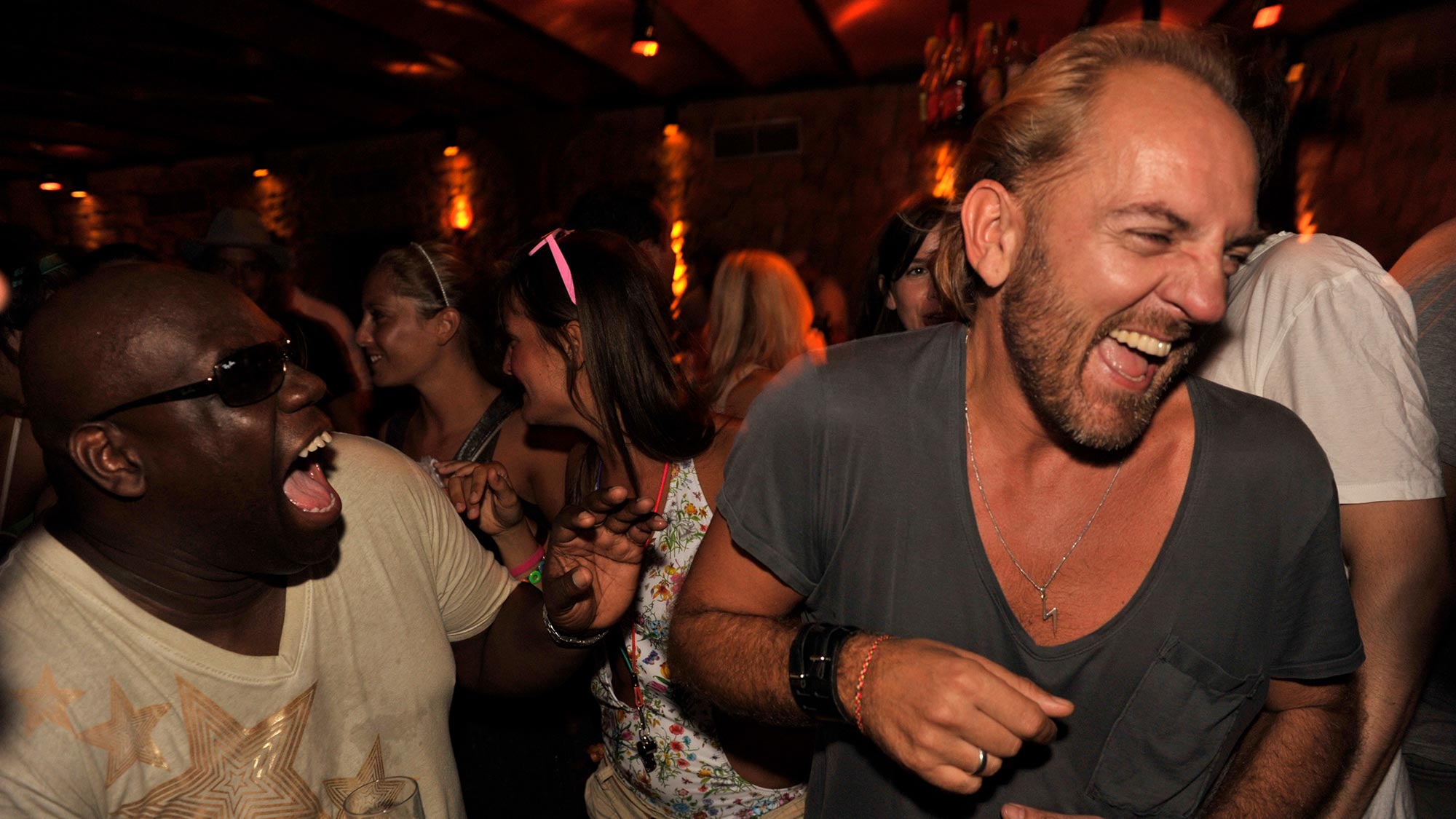Above: Sven Väth 2009 with Carl Cox on Ibiza. All photos: phrank.net.
Hier findet ihr die deutschsprachige Fassung des Interviews.
„Club Omen is my living room.“ What did Sven Väth mean with this notorious statement from the 1990s? This is one of the talking points he discusses in the third part of our longform interview with the DJ, producer, singer and host. He also remembers the birth of the Cocoon family and he shares his opinion about the young techno generation with its Instagram DJs.
Back in the second half of the 1980s you made a name for yourself playing seminal Frankfurt clubs like Dorian Gray and Vogue and you got your first international bookings at places like Wag Club in London. But in 1988 you bought Vogue with two friends to run your own club. Why did you feel the need to do this at the very same moment your international career took off?
Sven Väth: The energy was there, a vision, and it went well in the end. Everyone looked at me incredulously at first and said: „What are you doing now?” (laughing) At the beginning, as we opened club Omen, our music program was still relatively mixed. That was intentional, I did not want to hit the same spot again as in Dorian Gray with its dark industrial sound. This chapter was closed. Omen was supposed to be a modern place, there was Hip hop as well, Snap!’s „The Power” just happened, another project of my partner Michael Münzing [who also collaborated with Väth in his band OFF]. Internationally there was a lot going on: R&S, NuGroove, all the labels from Detroit and Chicago, Strictly Rhythm from New York and so on. That was the signal for me to decide that we solely wanted to focus on Techno and House music. That was in 1989. I had my own night on Friday, for Saturday I brought in DJ Dag.
You notoriously explained: „Club Omen is my living room.” How can a Techno club be someone’s living room?
My vision became flesh and blood. People felt it, they were there and they were all part of it. It was intense and excessive times. No limits – we gave everything, we stood in our sweat. (laughing) We had a lot of terrific nights, with The Prodigy and Underground Resistance, label nights by Plus 8 and Djax-Up Beats and so on. Richie Hawtin had his first residency in Europe at Omen. Jeff Mills played about four times a year. Although I have been increasingly booked internationally, I always made sure I was there on Friday nights.
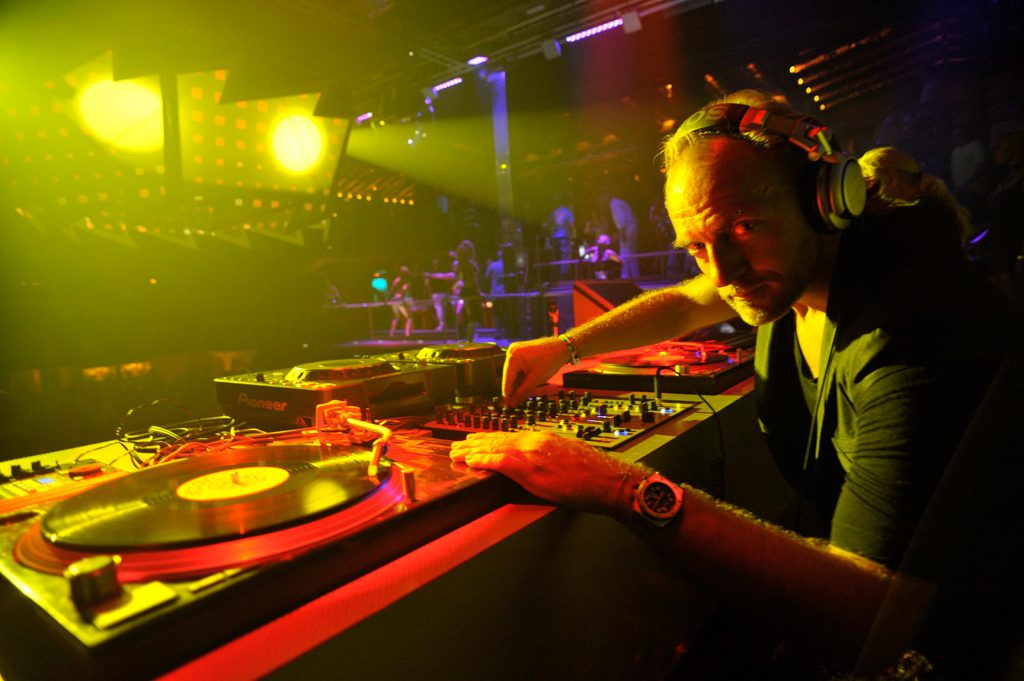
The club was an incredible success, it is still considered as the techno club of techno clubs among many. Nevertheless, the 90s were also incredibly changeable for you. You ran Omen, and you also ran two huge Techno labels – Harthouse and Eye Q, shaping the sound of Frankfurt. But both labels existed only for a relatively short period of time, at least from a current point. Cocoon Recordings has been around for over 20 years now. It may be hard to understand today how you were able to build so much so quickly. But it also imploded pretty quick as well.
There were conflicts of interest. That was still the time of the transition from analogue to digital. We founded Eye Q and Harthouse in late ’89 or ’90, and I gave it away in 1997. In the meantime, we published quite a lot.
With a very fast pace by today’s standards. There are hardly any labels of this scope that could do that.
We had an office in London and one in West Hollywood. We created a buzz, but as we reached a certain point, one of my business partners said he wanted more, more and more. At the time I had actually already said goodbye to the project. I did not want to pursue the [Trance] sound any further. That was it for me.
„I was always open to change, as it offered me a fresh start.”
How did you realize Trance is over?
That was just an impulse. It was as much an impulse as I quit [pop group] OFF in ’89. Back then I decided I wanted to end my pop career and focus on my solo project as Sven Väth as a DJ. I didn’t need an alias anymore. This were all decisions by instinct, also drawing from experience. I understood I did not want to go through certain things again, or I want to experience them in a different way.
Where did you stand at the end of the nineties when you were done with Omen, Harthouse and Eye Q?
Cocoon was already born. The first Cocoon party took place in ’96 with Underworld performing live at the Union Brewery on Hanauer Landstrasse [in Frankfurt]. Before that, I attended a performance at Tempodrom in Berlin by La Fura dels Baus, which is an action theater from Catalonia. I watched one of their shows, it was dealing with metamorphoses. It had a lasting effect on me, that’s how I found the name Cocoon. Because the club and the labels were gone, I was ready to introduce something new. India helped me with what I’ve experienced there, as well as the Love Parade and the evolution of the music. That is why I have already been looking forward to do something new. In ’98, I sat down with my partners and told them: „I think we should close Omen now.” The parking garage in which the club was located has already put pressure on us anyway, they wouldn’t have extended our lease sooner or later. Then I pulled the plug. That was change as well, ultimately opening the door to the Cocoon vision. I was always open to change, as it offered me a fresh start.
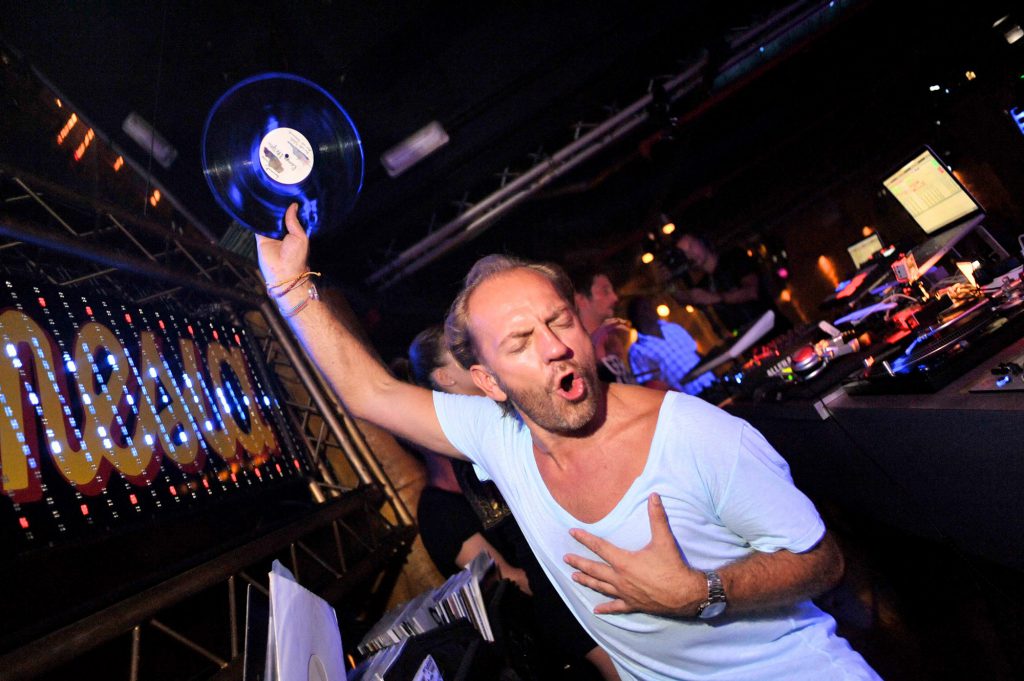
That is interesting. In Berlin, the end of the 90s was perceived as a major loss, there was a deep feeling of disorientation and sometimes even depression. Did you feel something similar?
Nope. I started Ibiza and Cocoon Recordings.
And the club.
No, the club came much later, in 2004 – that was already the noughties. First, I had the idea to start a booking agency. I simply contacted the artists I knew and offered them to use my structure giving them a little bit of support. So one thing came to the other. That wasn’t a master plan putting it together to hit it off in Ibiza or worldwide. It was self-taught, to build something in order to give the music a platform, receiving new impulses, offering young people security, so that they are taken care of and being able to live out their creativity.
Many DJs tend to be lone wolf types, mainly concerned with themselves, their music and the external perception. You’re more of a family man, thinking of others, the scene and your clubs and parties.
My vision started to go beyond the turntables relatively early. (laughing) I wanted to create more room with the music, the energy, the power and what it meant to us, to be able to present ourselves and develop. We invited great artists to our events, and we also told a story with the design. This has developed over the years, we made new contacts and met new artists. There was even more to tell. To me, a club has always been the logical consequence – it has to take place on the dancefloor. That has always been driving me, because everything was created on the dancefloor. We also make festivals today, we play big stages as well and feel comfortable there. Still, the club’s dance floor is sacred.
„I love to start in an empty club, creating a certain vibe, already setting a certain mood with the first guests, relying on empirical values that others do not have.”
To conclude: In the meantime, the 90s are over for 20 years, a whole generation joined the scene afterwards. What do you think about your future and the future of electronic music in general?
Of course, a lot has changed, it’s all very fast-paced. The young people consume music differently today. They are busy with things other than listening to an album. They just want to follow, like and post. Sometimes they do not really seem to listen, sometimes they are not really there. (smiling) Luckily, I still relate to enough people, including a relatively large young crowd coming to our events. This works improbably well with the older generation. It is, as I said at the beginning, a colorful mix. I still enjoy playing long sets, creating something with my records what I’ve been doing for almost 40 years.
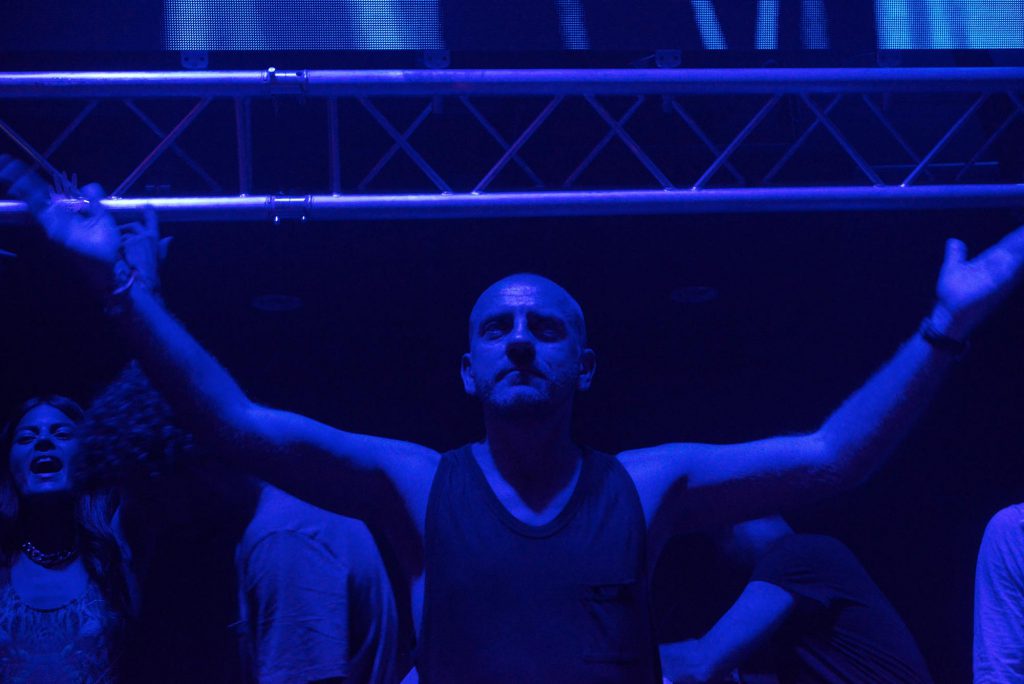
How do you address the younger generation with your extensive background?
I think people just feel that there’s a heart behind the music. As I’m also coming from the dance floor, people hopefully understand I’m still with them, and not hiding. I always try to be a 100 percent present. You can not blame the younger ones either, they do not have this experience. There are Instagram DJs currently being popular. They make me wonder: Where should they get their knowledge from? The sets are preprogrammed. Young DJs already have managers telling them how to play, where to play, when to play. The DJ culture, as I know it, is something fundamentally different. That’s why my performance may still give good impulses. And there is a renaissance of vinyl as well.
What bothers you musically with the current sound?
All those breaks and the compulsion to constantly have peak-time moments. Let’s listen through a record from beginning to end! Also all these gadgets in the DJ Booth, controllers to modify the music or samplers to create additional loops. I consider this to be all very artificial and I’m not impressed. (laughing) That’s all the result of the same scheme, to be able to control the music in advance. I regularly notice it all along when I ask someone if they can play a warm-up set: They tell me: „Why? The club is still empty then!” (laughing) Yes, exactly! I love to start in an empty club, creating a certain vibe, already setting a certain mood with the first guests, relying on empirical values that others do not have.
How do you translate your wealth of experience into your sets?
We talked about resident DJs earlier, I’ve continuously held a residency in one club or another for almost 30 years. Be it at Dorian Gray, Vogue, Omen, U60[311] or the Cocoon Club. This is crucial for a DJ. Over the years you notice how the music, people’s habits and the technology are changing. As an experienced DJ, you can dig deeper into the box – or in my four record boxes! I actually put together three record boxes from the past 20 years for the anniversary, with afterhour highlights and highlights from the club. Some of them are now part in my sets, to mark a little something here and there. That’s fun, too, even though I’m actually someone playing 95 percent new music.
I haven’t heard „Snabeln” from Hugg & Pepp for ages.
Yes, and [Underworld’s] „Born Slippy” was great as well, of course, I went on stage and rounded off the night with Karl [Hyde] and Rick [Smith of Underworld] dancing as they performed. Of course that was big fun as well.
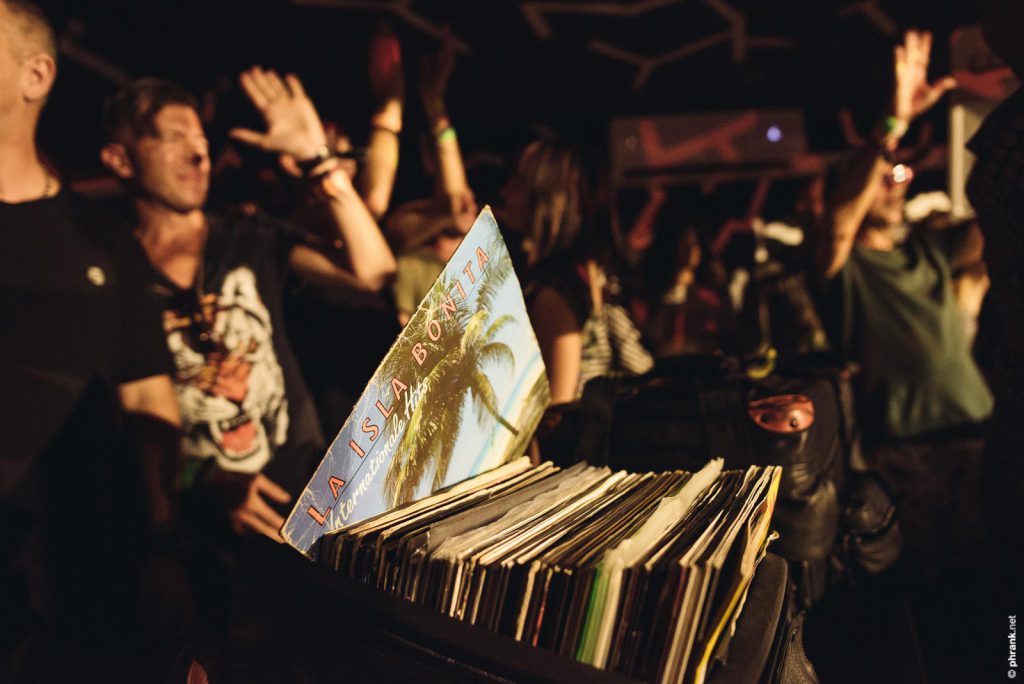
And you played „La Isla Bonita” by Madonna at the afterhour at Rabbit Hole at the end of the anniversary weekend.
I did. (smirkingly) That’s a special number! I believe Madonna wrote the song for Ibiza. Well, nobody really knows, but she talks of the Spanish island. What else is that supposed to be?
I haven’t thought of that yet.
How she addresses the island, I’ve always connected it to Ibiza! But I do not play the number regularly. It is an extra joker.
Read the first and the second part of our longform interview with Sven Väth here and here.
